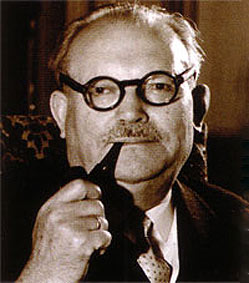Remy Warnot: Difference between revisions
No edit summary |
mNo edit summary |
||
| Line 42: | Line 42: | ||
}}}} | }}}} | ||
'''Remy Warnot''' ( | '''Remy Warnot''' (8 July 1887 – 14 April 1962) was an Autuzian revolutionary and politician who served as [[Prime Minister of Auzance]] and [[Authoritarians (Auzance)#Leader|Leader of the Authoritarians]] from 1934 to 1948. Initially identifying as a {{wp|council communist}}, his rule has since been described as dictatorial, authoritarian and illiberal, ultimately culminating in his deposition from power in the 1948 coup d'état. | ||
Warnot was born in 1897 in the north-western rural province of [[Erîa]], ten kilometres west of Lugnî, to a working-class Autuzian-speaking family. Growing up during the onset of the [[Great Collapse]] and coming of age as the [[Great War (Kylaris)]] loomed, Warnot grew disillusioned with the Gaullican regime, and in the early 1930s joined the underground resistance movement. Erîa was one of the first few regions to see sustained rebellion, with the independence movement under the Provisional Government gaining control of much of the region by early 1933; as such, Warnot became key in the role of the Provisional Government, and was elected its Prime Minister in July 1933 following his appointment as Authoritarian Party leader two months prior. | Warnot was born in 1897 in the north-western rural province of [[Erîa]], ten kilometres west of Lugnî, to a working-class Autuzian-speaking family. Growing up during the onset of the [[Great Collapse]] and coming of age as the [[Great War (Kylaris)]] loomed, Warnot grew disillusioned with the Gaullican regime, and in the early 1930s joined the underground resistance movement. Erîa was one of the first few regions to see sustained rebellion, with the independence movement under the Provisional Government gaining control of much of the region by early 1933; as such, Warnot became key in the role of the Provisional Government, and was elected its Prime Minister in July 1933 following his appointment as Authoritarian Party leader two months prior. | ||
Revision as of 18:13, 23 November 2023
Remy Warnot Former Prime Minister of Auzance | |
|---|---|
 Warnot, in 1941 | |
| Prime Minister of Auzance | |
| In office 15 July, 1934 – 8 February, 1948 | |
| Preceded by | Andreye Tchîpas |
| Succeeded by | Silviye Vanole |
| Leader of the Authoritarians | |
| In office 21 May, 1934 – 8 February, 1948 | |
| Preceded by | Office created |
| Succeeded by | Silviye Vanole |
| Personal details | |
| Born | Remy Bnoet Warnot July 8, 1887 Erîa, Auzance |
| Died | April 14, 1962 (aged 74) Cestiène, Auzance |
| Citizenship | Autuzian |
| Political party | Authoritarian (1933-) |
| Spouse |
|
Remy Warnot (8 July 1887 – 14 April 1962) was an Autuzian revolutionary and politician who served as Prime Minister of Auzance and Leader of the Authoritarians from 1934 to 1948. Initially identifying as a council communist, his rule has since been described as dictatorial, authoritarian and illiberal, ultimately culminating in his deposition from power in the 1948 coup d'état.
Warnot was born in 1897 in the north-western rural province of Erîa, ten kilometres west of Lugnî, to a working-class Autuzian-speaking family. Growing up during the onset of the Great Collapse and coming of age as the Great War (Kylaris) loomed, Warnot grew disillusioned with the Gaullican regime, and in the early 1930s joined the underground resistance movement. Erîa was one of the first few regions to see sustained rebellion, with the independence movement under the Provisional Government gaining control of much of the region by early 1933; as such, Warnot became key in the role of the Provisional Government, and was elected its Prime Minister in July 1933 following his appointment as Authoritarian Party leader two months prior.
Beginning his term as a moderate mediator and broadly accepted by the wide coalition of far-left to centre-right parties within the Provisional Government's makeup, Warnot gradually centralised his control and sidelined non-councilist parties during his first years of power. Auzance's initial pseudo-democratic government slowly slipped towards authoritarianism under his control, and he became more dictatorial as his regime aged; his defunctionalisation programme, initially a way to democratically promote Autuzian identity and language as well as re-educate and rehabilitate the far-right, gradually became a byword for his programme of political incarceration, brutal clampdowns on Gaullican (and Miersan, in his home region) heritage and language, and use of military to command control over the provinces. Defunctionalisation also included the seizure of private assets, a policy that became increasingly widespread, targeted and violent as he aged. One round of elections were held in 1938 following his election in 1934, but were then suspended each term until his resignation.
Dissatisfaction with the Warnot government from both Autuzian citizens, and from Valduvia's government - who by this point Auzance had become reliant on militarily - grew; Auzance returned to persistent social and civil unrest, while the direction of the Warnot government in the 1940s towards state socialism was counter to Valduvia's aims to use the state as a councilist regime. Within his party, moderates felt his decision to suspend elections and to prolong the end of defunctionalisation well into the 1950s as per plans written up in 1947 were undemocratic and tyrannical, and it is widely believed - but unconfirmed - that Valduvia's regime orchestrated a coup d'état along with many of these party moderates (one of whom succeeded him as Prime Minister) to steer Auzance back to council communist republicanism. Warnot retired from politics following his removal from power, and died in 1962, aged 74.
Warnot's legacy is controversial; many view his role in ensuring Auzance's independence and revolutionary movement were kept both together and intact during its crucial phase of breaking off from functionalist Gaullica was pivotal, while his first years set in motion the creations of a mostly democratic council republic. However, especially in recent decades, Warnot's regime - particularly the last decade - are viewed as exhibiting authoritarian, oppressive tendencies, of brutally suppressing civil disobedience and political differences, and his treatment of minorities and their cultures within Auzance has since been viewed as institutionally racist.
